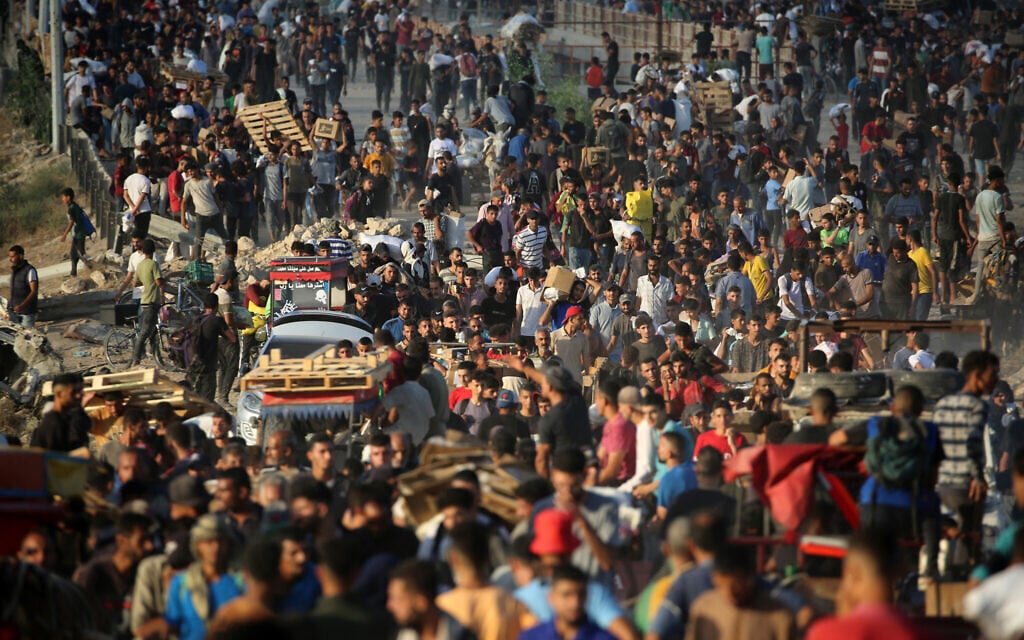The past few weeks have been nothing short of a rollercoaster of emotions, especially for those closely following the unfolding events in Israel. On the one hand, the release of the Bedouin hostage was an answer to prayer and a moment of deep relief. Yet, on the other, the heart-wrenching murder of six innocent Israelis at the hands of Hamas left many of us grappling with an overwhelming sense of grief and confusion.
Like many, I found myself at a loss for words—unsure even of what to pray for—especially as I prepared for our prayer gathering on Monday evening. (I must shamelessly plug here: if you haven’t attended one of these, I highly recommend it: Zoom link.) As I sought the Lord on these matters, often with tears, I couldn’t help but reflect on the depth of evil that Hamas has unleashed upon the innocent. It was not merely the atrocities themselves but the cold-hearted political manoeuvrings, such as the UK’s decision to suspend arms licenses to Israel the day after hostages were murdered, that troubled me deeply.
In the midst of this moral chaos, the Lord has drawn me to a few truths that I feel are vital to share, especially for those of us who believe in the power of prayer and God’s providence.
The Lord’s Will Above Ours
We often hear about “praying in accordance with God’s will,” but how often do we truly mean it? I’ll confess, many times, I find myself fervently praying for what I believe is the best outcome—what makes sense to me in my limited understanding. This, of course, isn’t inherently wrong, but there is a subtle danger in becoming fixated on what we think should happen rather than seeking what He knows must happen. The reality is that God’s will, not ours, is the ultimate good—even when it doesn’t appear that way.
Let’s not sugarcoat this: the current situation in Israel, and indeed much of the world, is not going to be easily resolved, nor will it be free of hardship. In fact, Jesus Himself warned us that times like these must come. He said, “And you will hear of wars and rumours of wars. See that you are not troubled; for all these things must come to pass, but the end is not yet” (Matthew 24:6, NKJV). We know that the trials we are witnessing are part of the larger plan foretold in Scripture.
This may sound basic, but it’s a truth we often need to be reminded of: not every prayer will be answered in the way we hope. And in those moments, our task is to humble ourselves, remembering that our perspective is limited, while God sees the end from the beginning. As the prophet Isaiah wrote, “For My thoughts are not your thoughts, nor are your ways My ways,” says the Lord (Isaiah 55:8, NKJV). Our humility, then, is key to exalting Him and aligning ourselves with His sovereign plan.
Loving Your Enemy: A Command Beyond the Natural
In an age of relentless verbal warfare, amplified by media and inflamed by social platforms, it is all too easy to become swept up in the anger and rhetoric. The constant cycle of hostility highlights a deeper, spiritual battle—a battle between the moral order that God has established and the distorted philosophies that mankind tries to put in its place. But amidst this din, one thing seems to have been lost: a genuine conversation about loving our enemies, as Jesus commanded us.
Now, let me clear my throat here—I am fully aware that wars happen, that there are distinct biblical principles for dealing with conflict, and that in certain circumstances, lethal force is a tragic necessity. We are not called to live in naivety. When Israel’s defence forces take action against Hamas, an organization that perpetrates unspeakable evil, it is not only justified but necessary. Yet, here lies the uncomfortable tension: how are we, as Christians, to reconcile supporting the defeat of this evil with the command to love our enemies?
Jesus’ words on this matter are unmistakable: “But I say to you, love your enemies, bless those who curse you, do good to those who hate you, and pray for those who spitefully use you and persecute you” (Matthew 5:44, NKJV). His standard is a higher one, far above what the world can comprehend. Where others seek vengeance or merely justice, Christ calls us to something far more difficult: love.
But how do we love such people, especially when they commit atrocities? The answer, I believe, lies in prayer. While we may rightly support the IDF’s decision to neutralize terrorists, we must also be willing to pray for them. It is an agonizing paradox, and I admit, it is one that I struggle with profoundly. Yet Jesus never promised His commands would be easy; He promised His Spirit to strengthen us when we cannot fulfil them on our own. And so, I ask you—ask the Holy Spirit for the strength to do what feels impossible: to pray for your enemies, even when they seem beyond redemption.
Brethren, Dwell Together in Unity
In our latest video at PFI, I shared a poignant story about Sapir Cohen, one of the hostages released after 55 harrowing days of captivity in Gaza. Due to time constraints, I couldn’t discuss everything that transpired during her ordeal. Since the recording, the tragic news has emerged that six more hostages were murdered by Hamas, a detail I wish I had included. So, I’ll take this moment to leave you with a thought that I believe is critical for us to reflect on.
Sapir spoke of how, during her captivity, she caught glimpses of Israelis uniting in solidarity to bring the hostages home. What surprised her was that on October 7th, when she was taken, Israel was a nation divided—fractured across political and social lines. Yet, in the face of crisis, seeing her fellow citizens stand together for a common cause gave her hope, warmth, and a renewed belief in her nation.
This speaks volumes, not just for Israel but for all of us. The murder of these six hostages has already sown new seeds of division across the country, and while there are still pockets of unity, the fragility of that unity is tearing under the weight of this tragedy. This, my friends, is exactly what the enemy desires—division, chaos, and fragmentation.
Let us not allow this to happen. In Psalm 133:1, we are reminded: “Behold, how good and how pleasant it is for brethren to dwell together in unity!” (NKJV). Unity is not just a moral good; it is a divine principle, one that the enemy seeks to undermine at every opportunity. We must pray fervently for Israel, for the families of those murdered, and for those still in captivity. But we must also pray for unity—for our brothers and sisters to stand together, not just in times of external threat, but in all times, to reflect the heart of God in their collective resolve.
The enemy thrives on division, and as Christians, we know the vital importance of unity in Christ. It is what will ultimately bring light into the darkest situations. As we intercede for Israel, let us ask that this spirit of solidarity continues and that those who seek to divide are thwarted by the unity of a people standing firm in God’s providence.
Government Rifts and the Weight of Responsibility
The deaths of the hostages have not only shattered the hearts of many but also deepened the divisions within the Israeli government. Sadly, this is not surprising, but there’s something different about this situation. A growing number of people are placing the blame squarely on Prime Minister Benjamin Netanyahu for the loss of these innocent lives. However, while leadership always bears some responsibility, we must acknowledge the truth: the blood of these hostages is ultimately on Hamas. It was Hamas who refused to negotiate in good faith, and it was Hamas who literally pulled the trigger on hostages slated for exchange.
The world, in its typical double standard, often expects Israel to make all the concessions simply because it is a democratic state, while they seem to give a free pass to Hamas—a terrorist organization. The burden of moral responsibility always seems to fall on Israel, as if Hamas, being what they are, is somehow beyond the reach of such expectations. This imbalance is both irrational and dangerous, and it’s deeply frustrating to see it play out time and time again on the world stage.
Additionally, as I mentioned earlier, the UK government’s recent decision to halt certain arms sales to Israel defies reason. In a time when Israel is defending itself against unprovoked and barbaric acts of terror, this move feels not only counterproductive but morally questionable. It underscores the frustrating reality of how international politics often fail to recognize the simple truth of who is perpetrating violence and who is fighting for survival.
I urge you to pray for the leaders of Israel, for our own government, and for leaders across the world. Pray that they may be granted wisdom and clarity, to make decisions that align not with human agendas but with God’s will. As it is written, “The king’s heart is in the hand of the Lord, like the rivers of water; He turns it wherever He wishes” (Proverbs 21:1, NKJV). May the Lord guide them to act justly and with the courage to uphold what is right.
In these difficult and tumultuous times, we are called not only to observe and lament the events unfolding before us but to take up the spiritual responsibility of intercession. The challenges facing Israel, the division within its government, and the hostilities that rage on are not isolated incidents. They are part of the greater spiritual battle we, as followers of Christ, are intimately aware of.
Yet, in the midst of this chaos, our task is clear: we must align ourselves with God’s will, love our enemies in the face of evil, pray for unity among God’s people, and stand firm in our trust that He is sovereign over all things.
As we continue to pray for Israel, for peace, for justice, and for God’s perfect will to be done, let us never lose sight of the higher calling we have—to be lights in this dark world and to bear witness to His truth, love, and grace in everything we do.
In Him,
Kaleb Franck






